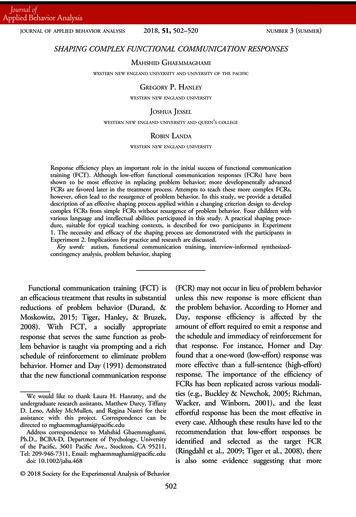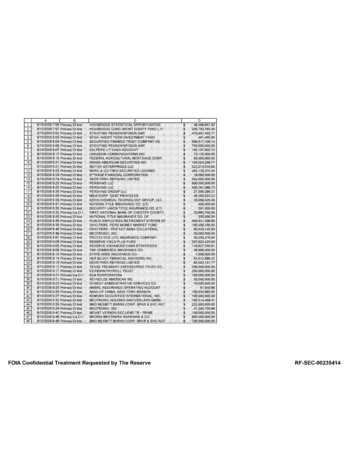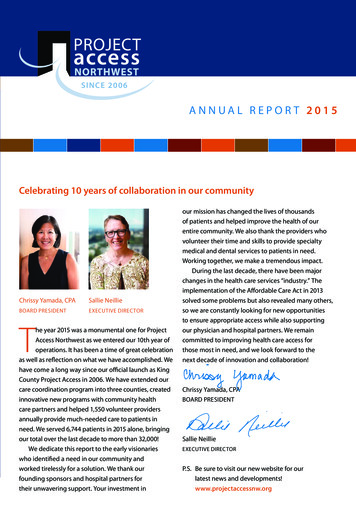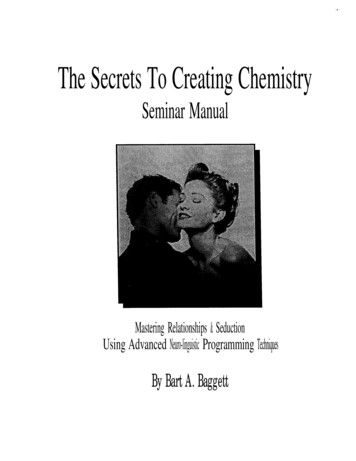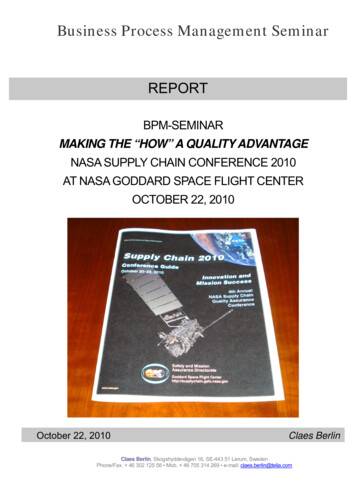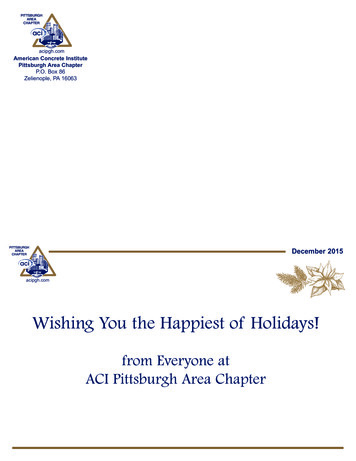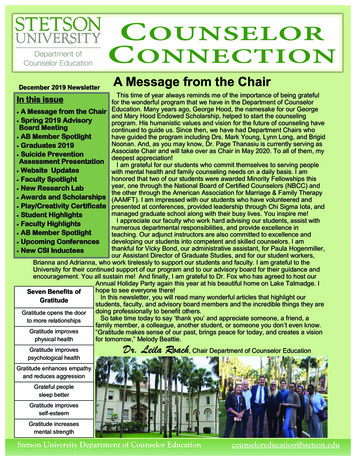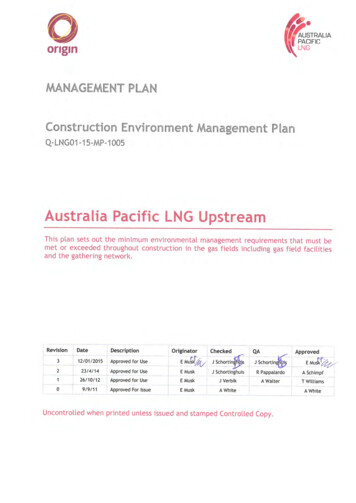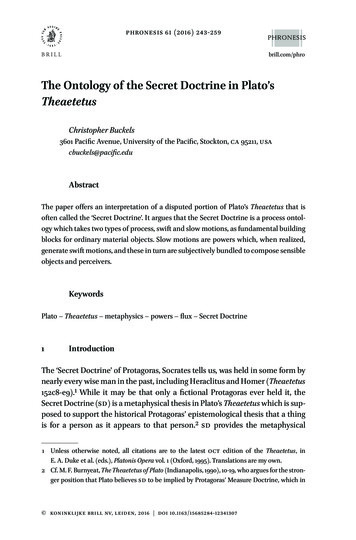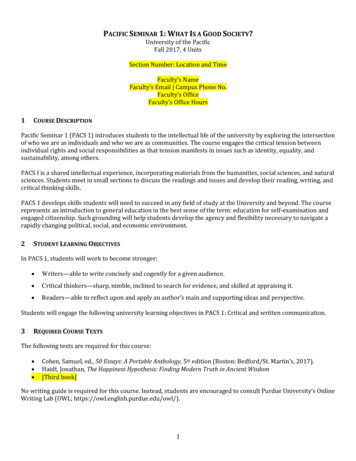
Transcription
PACIFIC SEMINAR 1: WHAT IS A GOOD SOCIETY?University of the PacificFall 2017, 4 UnitsSection Number: Location and TimeFaculty's NameFaculty's Email Campus Phone No.Faculty's OfficeFaculty's Office Hours1COURSE DESCRIPTIONPacific Seminar 1 (PACS 1) introduces students to the intellectual life of the university by exploring the intersectionof who we are as individuals and who we are as communities. The course engages the critical tension betweenindividual rights and social responsibilities as that tension manifests in issues such as identity, equality, andsustainability, among others.PACS I is a shared intellectual experience, incorporating materials from the humanities, social sciences, and naturalsciences. Students meet in small sections to discuss the readings and issues and develop their reading, writing, andcritical thinking skills.PACS 1 develops skills students will need to succeed in any field of study at the University and beyond. The courserepresents an introduction to general education in the best sense of the term: education for self-examination andengaged citizenship. Such grounding will help students develop the agency and flexibility necessary to navigate arapidly changing political, social, and economic environment.2STUDENT LEARNING OBJECTIVESIn PACS 1, students will work to become stronger: Writers—able to write concisely and cogently for a given audience. Critical thinkers—sharp, nimble, inclined to search for evidence, and skilled at appraising it. Readers—able to reflect upon and apply an author’s main and supporting ideas and perspective.Students will engage the following university learning objectives in PACS 1: Critical and written communication.3REQUIRED COURSE TEXTSThe following texts are required for this course: Cohen, Samuel, ed., 50 Essays: A Portable Anthology, 5th edition (Boston: Bedford/St. Martin’s, 2017).Haidt, Jonathan, The Happiness Hypothesis: Finding Modern Truth in Ancient Wisdom[Third book]No writing guide is required for this course. Instead, students are encouraged to consult Purdue University’s OnlineWriting Lab (OWL; https://owl.english.purdue.edu/owl/).1
4COURSE GRADE COMPONENTSYour grade in this course will be a function of the following elements:WritingEssaysAdditional writingReading assessmentSection participationOther work60-75%[40-50%][20-25%]5-15%10-20%5-10%As determined by university accreditation, Pacific's general education program must conduct assessment of itsprogram. Your work in the course might be used for assessment purposes. Student names would be anonymousduring assessment work and would not appear in any results. Thanks for your cooperation. If you do not want yourwork to be used for assessment purposes, please submit a written statement to the Director of General Education.4.1WritingIn total, all students in each section of PACS 1 will write approximately 6,000-7,000 words of finished, gradedprose, although this amount will be distributed differently from one section to another.4.1.1EssaysThe course requires three original essays, each between 1,300–1,400 words in length (about 5-6 pages). Each ofthese essays will be in response to a prompt designed and distributed by your professor. Your professor will tellyou the specific due dates for your class.In each paper, you will be required (a) to respond to the ideas developed in class discussion and in the coursereadings and (b) to offer a clear response to the question asked in the assignment prompt. All essays should be in12 point font, double-spaced, with normal margins.For more information on what is expected in each essay, please see the grading rubric attached to this syllabus(Sec. 10.2).All formal essays must be submitted through your section’s Canvas site, where they will be scored for originalityagainst Turnitin.com’s anti-plagiarism database.4.1.2Additional WritingYour professor will be assigning about 2,000 words of additional writing beyond the three essays described above.This total of 2,000 words may include another large essay, short essays, reaction pieces to certain readings, formalsummaries of the main arguments of articles, etc. Your professor will let you know what the specific requirementsare for your section.4.2Reading AssessmentReading carefully and critically lays the foundation for college-level writing and is necessary for effectiveparticipation in class discussions. In past years, students who reported carefully completing the course readingassignments also reported learning more than students who did not report completing the readings. As such, yourprofessor will regularly assign projects, quizzes, and other activities to ensure that you are doing the reading andunderstand the course material.2
4.3Section ParticipationClass participation is crucial to your success and the success of this course, including how much you learn and howmuch fun you have with your classmates. Come to class having read and/or viewed everything assigned for thatday. Be prepared to ask and answer questions about the assignments, be prepared to dissect the arguments andfigure out what you think about them and why you think that, and be prepared to engage in informal in-classwriting about the readings if your professor builds that in as part of participation. Be prepared to consider and talkabout the different kinds of works you will be exposed to: research articles, articles making a philosophicalargument, stories, poems, paintings, and photographs.“Participation” may include asking your own questions, responding to the instructor’s or fellow students’ questionsand comments, contributing to group learning activities, completing in-class writing exercises, doing presentations,or participating in various other in-class activities designed by your instructor. Thus, it is more than simply talkingin class each day. Class participation is an important way to develop individual critical thinking skills and tocontribute to a collective learning process, which often yields greater results than studying in isolation.Please see the grading rubric attached to this syllabus for more information on the parameters, expectations, andcriteria for class participation in your particular section.4.4Other WorkYour professor will assign other work during the semester. These assignments will vary from section to section.5PACS GENERAL SESSION LECTURESAt two points during the semester, all Pacific Seminars students will come together in general sessions to hear aninvited speaker. The two lectures are scheduled for Thursday, October 12, 12-12:45pm with David Kung, “Mind-Bending Math Paradoxes & the Possibility ofChanging Your Mind,” Room TBA Thursday, November 16, 6-8pm, Poetry Slam in Faye Spanos Concert HallThese sessions are part of the course, and therefore attendance is mandatory. Please arrive early so that thelectures can start promptly at 12noon.6PACIFIC SEMINAR ARTS EXPERIENCEEach section of PACS 1 will attend an arts experience—for example, a concert, a theater performance, a civicfestival, or a gallery exhibition—as a group. The specific arts experience will be determined by your professor. Thearts experience is part of the course, and so attendance at this event is mandatory. You will spend time in classbefore and/or after your arts experience to discuss and debrief.77.1COURSE POLICIESAttendanceParticipating in class discussion is an essential part of the Pacific Seminar experience, and regular attendancedevelops the habit of being responsible for your commitments. In this course, students are allowed threeunexcused absences for sections meeting three times a week (i.e., WMF) and two unexcused absences for sectionsmeeting twice a week (i.e., TR) during the semester. After two or three unexcused absences, your final grade for thecourse will be lowered by one-third of a grade (i.e., from a “B ” to a “B”) for each day that you are absent from classwithout a valid excuse. This means that if you are in a MWF section and you miss five days of class without a validexcuse, your final grade for the course will be lowered by two-thirds of a grade (i.e., from a “B ” to a “B-”). A validexcuse for missing class will require written documentation from a person who can certify the seriousness of your3
illness or other misfortune. Your instructor may require some form of make-up work for participation missedduring an excused absence.7.2Late PapersIf a formal essay is turned in late and there is no legitimate excuse, then the essay grade will be lowered one fullletter grade for every calendar day that it is late. For the late policy for your other work in the course, consultyour instructor’s section syllabus.7.3CanvasFaculty will maintain a section-specific Canvas site to enrich the Pacific Seminar 1 learning experience. The site islocated at https://pacific.instructure.com/ Login with your PacificNet ID and password.7.4Honor CodeThe Honor Code at the University of the Pacific calls upon each student to exhibit a high degree of maturity,responsibility, and personal integrity. Students are expected to: Act honestly in all matters,Actively encourage academic integrity,Discourage any form of cheating or dishonesty by others, andInform the instructor and appropriate university administrator if she or he has a reasonable and good faithbelief and substantial evidence that a violation of the Academic Honesty Policy has occurred.Violations will be referred to and investigated by the Office of Student Conduct and Community Standards. If astudent is found responsible, it will be documented as part of her or his permanent academic record. A studentmay receive a range of penalties, including failure of an assignment, failure of the course, suspension, or dismissalfrom the University. The Academic Honesty Policy is located in Tiger Lore and online .html7.5Students with DisabilitiesIf you are a student with a disability who requires accommodations, please contact the Director of the Office ofServices for Students with Disabilities (SSD) for information on how to obtain an Accommodations Request Letter.3-Step Accommodation Process1. Student meets with the SSD Director and provides documentation and completes registration forms.2. Student requests accommodation(s) each semester by completing the Request for Accommodations Form.3. Student arranges to meet with his/her professors to discuss the accommodation(s) and to sign theAccommodation Request LetterTo ensure timeliness of services, it is preferable that you obtain the accommodation letter(s) from the Office of SSD.Depending on course and session, the wait time may be as long as 1-2 weeks or as short as 1-2 days. After theinstructor receives the accommodation letter, please schedule a meeting with the instructor during office hours orsome other mutually convenient time to arrange the accommodation(s).The Office of Services for Students with Disabilities is located in the McCaffrey Center, Rm. 137. Phone: 209-9463221. Email: ssd@pacific.edu. Online: www.pacific.edu/disabilities4
8PACS PLUS SECTIONS (PACS 001P)Some PACS 1 sections are designated as PACS 1 Plus. Students in these sections are also enrolled in acorresponding PACS 001P section, taught by the same professor. The additional weekly meetings are mandatoryand will provide extra writing support. If you are in a PACS Plus section, your instructor will provide additionalinformation about the structure, content, and requirements for your section of PACS 001P.9PACS 1 WRITING MENTORSThere are Student Writing Mentors available in the Student Writing Center in the Library (2nd floor) specificallyfor PACS 1 students. The Writing Mentors offer on-demand, drop-in tutorials. They will see students on referralfrom faculty, by appointment from students themselves, or simply as “drop-ins.” Writing Mentors can assiststudent writers in the following ways: Holding regular, drop-in office hours in the Student Writing Center to handle a range of writing issuesConsulting with students in the early stages of writing: brainstorming, outlining, idea mapping, etc.Responding to first, second, or third drafts of assigned essaysAssisting students with required revisions of graded or returned essaysThe mentors, however, are NOT there to proofread, edit, or evaluate your drafts. They don’t do the work foryou; they help you with ideas on how you can improve.The Writing Center is open during regular Main Library hours for student use beginning September 11. The PACS 1Writing Mentor staffing schedule will be posted and information sent out to all faculty early in the semester.Appointments can be made by Melanie Hash at mhash@pacific.edu or 932-2969. Questions can be directed to theWriting Center Director, Eileen Camfield, at ecamfield@pacific.edu or 932-2970.5
10 2017 PACS 1 COURSE SCHEDULEDISCLAIMER: The instructor reserves the right to amend the class outline at any time as needed. It is incumbent uponyou as the students to check Canvas frequently for announcements and attend class regularly so that you are aware ofany changes.Week 1: Finding MeaningAug. 28 Introductions, Syllabus, ExpectationsAug. 30 Carr: Is Google Making Us Stupid? (pp. 87-98)Boyle, Sales, Lanier, Bogost, or Turkle (Canvas; Instructor picks 2 or 3)Sept. 1 Sedaris: Me Talk Pretty One Day (pp. 333-338)Whitehead: The Loser Edit (pp. 412-416)Joy: Surviving Sinatra (pp. 202-205)Week 2: Reading and WritingSept. 4 No Class—Labor DaySept. 6 Douglass: Learning to Read and Write (pp. 125-131)Malcolm X: Learning to Read (pp. 240-249)Sept. 8 Alexie: The Joy of Reading and Writing (pp. 22-26)Stephen King: Reading to Write (pp. 210-215)Week 3:Sept. 11Sept. 13Sept. 15Happiness HypothesisSynthesis Activity, Connection to Happiness HypothesisHaidt: Happiness Hypothesis, Ch. 1-2 (pp. 1-44)Haidt: Happiness Hypothesis, Ch. 3-4 (pp. 45-80)Week 4:Sept. 18Sept. 20Sept. 22Happiness HypothesisHaidt: Happiness Hypothesis, Ch. 5 (pp. 81-106)Haidt: Happiness Hypothesis, Ch. 6-7 (pp. 107-153)Haidt: Happiness Hypothesis, Ch. 8 (pp. 155-179)Week 5: Happiness HypothesisSept. 25 Haidt: Happiness Hypothesis, Ch. 9-10 (pp. 181-239)Sept. 27 Synthesis Activity, Connection to 50 EssaysEssay 1 due for Peer ExchangeSept. 29 Peer ReviewWeek 6: Gender and EducationOct. 2ESSAY 1 DUECofer: The Myth of the Latina Woman (pp. 103-110)Oct. 4Defoe: The Education of Women (pp. 111-115)Woolf: Professions for Women (pp. 417-423)Oct. 6Fall Break; No ClassWeek 7: Race RelationsOct. 9Baldwin: Notes of a Native Son (pp. 44-65)Oct. 11 Hurston: How It Feels to Be Colored Me (pp. 188-192)Lorde: The Fourth of July (pp. 221-225)Thursday, October 12, 12-12:45pm General Session: David Kung, “Mind-Bending Math Paradoxes & thePossibility of Changing Your Mind,” Room TBAOct. 13 Staples: Just Walk on By: Black Men and Public Space (pp. 339-343)Coates: The Paranoid Style of American Policing (pp. 99-102)6
Week 8: Nationality and EthnicityOct. 16 Anzaldua: How to Tame a Wild Tongue (pp. 27-39)Rodriguez: Memoirs of a Bilingual Childhood (pp. 289-312)Oct. 18 Tan: Mother Tongue (pp. 362-368)Mukherjee: Two Ways to Belong in America (pp. 267-271)Oct. 20 Kincaid: The Ugly Tourist (pp. 206-209)Week 9: Class and PovertyOct. 23 Ehrenreich: Serving in Florida (pp. 136-145)Tokumitsu: In the Name of Love (pp. 396-403)Oct. 25 Eighner: On Dumpster Diving (pp. 146-158)McPhee: The Search for Marvin Gardens (pp. 250-262)Oct. 27 Mike Rose: I Just Wanna Be Average (pp. 313-327)Week 10: Compassion and EmpathyOct. 30 Ascher: On Compassion (pp. 40-43)Adichie: To My One Love (pp. 17-21)Nov. 1 Synthesis Activity; Essay 2 due for peer exchangeNov. 3Peer ReviewWeek 11: NovelNov. 6 ESSAY 2 DUEBegin bookNov. 8 Book ContinuedNov. 10 Book ContinuedWeek 12: Book ContinuedNov. 13 Book ContinuedNov. 15 Book ContinuedThursday, November 16, 6-8pm, General Session: Poetry Slam in Faye Spanos Concert HallNov. 17 Finish Book, Synthesis Activity, Connect back to 50 EssaysWeek 13: Global ResponsibilityNov. 20 Klinkenborg: Our Vanishing Night (pp. 216-220)Millet: Victor’s Hall (pp. 263-266)Burdick: The Truth About Invasive Species (pp. 79-86)Nov. 22 Thanksgiving Break; no ClassNov. 24 Thanksgiving Break; no ClassWeek 14: Ethical QuestionsNov. 27 Swift: A Modest Proposal (pp. 353-361)Plato: The Allegory of the Cave (pp. 280-288)Nov. 29 Ericsson: The Ways We Lie (pp. 159-168)Mairs: On Being a Cripple (pp. 226-239)Dec. 1 Essay 3 Due for Peer ExchangeOrwell: Shooting an Elephant (pp. 272-279)Boswell: On War (p. 66-71)Week 15: Activism and ActionDec. 4 Peer Review Essay 3Dec. 6 Thoreau: Civil Disobedience (pp. 369-391)Zirin: Pre-Game (pp. 424-432)Dec. 8 ESSAY 3 DUEGladwell: The Revolution Will Not Be Tweeted (pp. 169-181)7
11 GRADING RUBRICS11.1 Participation RubricPACS 1 is a seminar, and its primary classroom activity is discussion. The components of classparticipation are attendance, attentiveness, and contributions.Attendance means being present, mentally as well as physically, AND being prepared with theday's materials—like having read the day’s assignment carefully. Working on other courses, surfingthe web, texting friends, napping, etc., mean that you’re not really mentally present. Note that thecourse has an attendance policy.Attentiveness means listening carefully, being a good audience for whomever is speaking,incorporating ideas into your own thinking, and preparing to respond with your own contributions.Contribution means adding something worthwhile to the class’s progress. Obvious examples arespeaking up to engage ideas from the readings or to respond to other students, or to the instructor’squestions. Less obvious but also valuable contributions might be to ask questions to clarifymeaning—a passage in the text, another student’s remark, or something the professor said.Example of a question: “What does the author mean by ?”Example of an interpretation: “I think the author means where she writes .”The A is earned when a student almost always contributes thoughtful ideas, asks interestingquestions, and responds reflectively not only to the professor’s questions but to other studentcomments as well. These students are highly attentive. A-level participation can be recognized asoffering insightful connections between ideas and/or readings, as being well grounded in thereadings, and as provoking more discussion without dominating the discussion.The B is earned when a student usually contributes thoughtful ideas, asks relevant questions, andresponds not only to the professor’s questions but to other student comments as well. Thesestudents are reliably attentive. Their engagement is evident but the analysis may not be as deep orwide-ranging as an A-level student’s. They will have almost always completed the readings andother course materials and be prepared with questions and interpretations.The C is earned when a student comes to class and listens and occasionally offers an observation,question, or critique. These students are unevenly attentive. They may show minimal engagementwith course readings and other materials. They may occasionally show lack of respect for otherstudents and instructor by not paying attention, such as texting or surfing the Internet, or studyingfor other classes.The D stands for deficient participation. This may be a result of not having done the reading, ofbeing inattentive in class, of not interacting with classmates respectfully, sleeping or doing otherwork during class, or some combination of these and similar poor classroom performance.The F is for unacceptable participation; it is a failing grade.8
9Excellent (A)A thoughtful, engaging,and sophisticated thesisthat covers all aspects ofthe writing task andextends beyond classdiscussion.A logical, thorough, andconcrete use of evidencethat fully supports themain points of theargument.A well-organizedprogression of mainpoints clearly linked tothe thesis that flows wellthrough a compellingintroduction, body, andconclusion.Demonstrates mastery ofgrammar, punctuation,spelling, and mechanics;observes formattingstandards; and followsappropriate citationguidelines.Language is varied,compelling, andemployed for effect;word choice (diction) isprecise and appropriate-creating a tone thatclearly communicates thewriter's stance.DimensionsFOCUS: A controllingidea (thesis) that shapesthe development of anargument within the fullcontext of the topicSUPPORT: Use ofevidence and reasoningto explain & defend anargumentCOHERENCE: Thesequence or arrangementof all the parts of anargumentCORRECTNESS:Using words andsentences according tothe rules and conventionsof written English andacademic writingSTYLE: Choosingwords carefully andcraftingsentences/paragraphssuitable for the topic,purpose, and audience11.2 Writing RubricDemonstrates competentcontrol of grammar,punctuation, spelling, andmechanics; observesformatting standards andfollows appropriatecitation guidelines withonly minor errors.Language is clear andword choice (diction) isappropriate--creating atone of generalcompetence andcredibility.An organized progressionof main points with aclear introduction, body,and conclusion.A mostly logical,thorough, and concreteuse of evidence thatsupports the main pointsof the argument but withsome lapses or weakpoints.A thoughtful andengaging thesis thatcovers most aspects ofthe writing task and mayextend beyond classdiscussion.Strong (B)Demonstrates basic butuneven competence ingrammar, punctuation,spelling, and mechanics;may observe formattingstandards and citationguidelines but with errorsthat obscure meaning.Language may be unclearand/or inappropriate (illformed sentences, slang,colloquialisms, jargon),confusing the argumentand raising some doubtsabout the writer'sintentions.An uneven progressionof main points with gapsor obstacles to makingconnections andtransitions betweenparagraphs.A limited or insufficientuse of evidence andreasoning in support ofthe main points of theargument.A basic or minimal thesisthat covers most aspectsof the writing task anddoes not extend beyondclass discussion.Adequate (C)Language is generallyconfusing or misleading,with enough words andsentences usedinappropriately to raiseserious doubts about thewriter's intentions.Poor use of grammar,punctuation, spelling, ormechanics; often misusesformatting standards andcitation guidelines.A confused arrangementof main points thatobscures meaning withan insufficientintroduction, conclusion,and/or transitionsbetween paragraphs.Errors or omissions in theuse of evidence and/orfaulty reasoning tosupport the main pointsof the argument.A superficial, simplistic,or incomplete thesisgiven the writing task.Not Adequate (D)Language throughout isoften inappropriate,confusing, or misleadingat the word and sentencelevels and fails tocommunicate basiccompetence.Seriously flawed use ofgrammar, punctuation,spelling, or mechanics;misuses or ignoresformatting standards andcitation guidelines.Random commentarywith no discernableprinciple of arrangement;absence of clearintroduction, conclusion,and/or transitionsbetween paragraphs.Primary reliance onassertion or invective toadvance the argumentand/or misuse ofevidence.An undeveloped orseriously flawed, poorlywritten, or off-topicthesis for the writingtask.Failing (F)
Haidt, Jonathan, The Happiness Hypothesis: Finding Modern Truth in Ancient Wisdom [Third book] No writing guide is required for this course. Instead, students are encouraged to consult Purdue University's Online Writing Lab (OWL; https://owl.english.purdue.edu/owl/).

